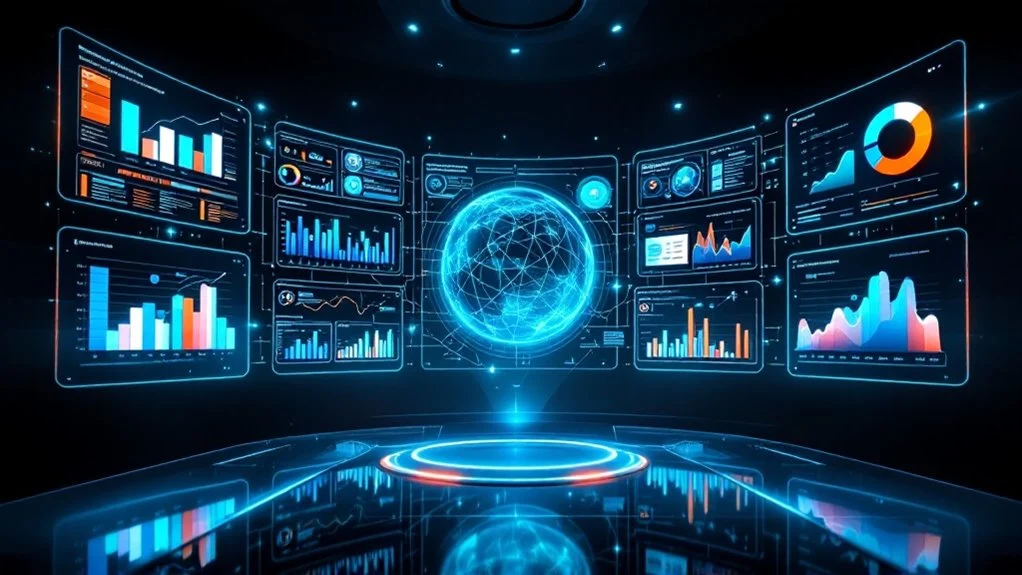AI in marketing uses intelligent computer systems to analyze data, automate tasks, and improve advertising campaigns. It helps companies understand customer behavior, create personalized content, and make data-driven decisions. AI tools can write copy, design graphics, and provide instant customer support through chatbots. The technology processes vast amounts of information faster than humans, leading to better campaign results and improved customer experiences. This rapidly growing field continues transforming how businesses connect with customers.

Nearly every marketing professional is embracing artificial intelligence (AI) to transform their work. The AI marketing industry, valued at $47.32 billion in 2025, is reshaping how companies connect with customers and manage their marketing efforts. With 9 out of 10 marketers planning to increase AI integration in 2025, it’s clear that AI has become essential for staying competitive in today’s digital landscape.
AI in marketing refers to the use of intelligent computer systems that can analyze data, create content, and make decisions faster than humans. These systems help marketers automate routine tasks and gain deeper insights into customer behavior. Currently, 93% of marketers use AI to generate content more quickly, while 81% rely on it to uncover valuable insights about their markets and customers. The COVID-19 pandemic has proven to be a major catalyst in the AI marketing transformation.
Marketing AI revolutionizes how we work, automating tasks and analyzing data to deliver faster, smarter insights for better customer understanding.
The technology’s impact on content creation has been particularly significant. AI tools can now write marketing copy, design graphics, and even create video content in a fraction of the time it would take human marketers. This efficiency allows marketing teams to produce more content while maintaining quality and consistency across different channels. Companies are seeing impressive results, with better SEO outcomes reported by 65% of businesses using AI tools.
Data analysis is another area where AI excels in marketing. These systems can process vast amounts of customer data to identify patterns and trends that might go unnoticed by human analysts. AI-powered predictive analytics help marketers forecast market trends and customer behaviors, leading to more informed decision-making and better campaign results.
Customer experience has been revolutionized by AI through personalization capabilities. AI systems can analyze individual customer preferences and behaviors to deliver tailored content, product recommendations, and communications. AI-powered chatbots provide instant customer support, while sophisticated algorithms help improve customer retention by predicting and addressing potential issues before they arise.
The future of AI in marketing looks promising, with the market projected to reach $107.5 billion by 2028. This growth is driven by rapid technological advancements and increasing adoption rates, with 85.84% of marketing professionals planning to expand their use of AI tools. The technology continues to evolve, offering more sophisticated solutions for content creation, data analysis, and customer engagement.
The integration of AI in marketing operations has become a key differentiator for businesses. Companies that effectively leverage AI can streamline their workflows, create more engaging content, and deliver better customer experiences.
This technology isn’t just changing how marketing is done; it’s setting new standards for efficiency and personalization in the industry.
Frequently Asked Questions
How Much Does AI Marketing Software Typically Cost for Small Businesses?
Small businesses typically invest around $1,800 annually on AI marketing software, with options ranging from free tools to monthly subscriptions starting at $50, while custom solutions begin at $5,000.
Can AI Marketing Tools Integrate With Existing CRM Platforms?
Most AI marketing tools are designed to integrate seamlessly with popular CRM platforms, offering features like automated data synchronization, lead scoring, and personalized customer communication across existing systems.
What Programming Skills Are Needed to Implement AI Marketing Solutions?
Essential programming skills include Python for data analysis, SQL for database management, R for statistical computing, and basic API knowledge for integrating various AI marketing tools and platforms.
How Long Does It Take to See Results From AI Marketing Campaigns?
Results from AI marketing campaigns typically appear within weeks for basic improvements, 3-6 months for significant conversion increases, and 12+ months for transformative strategic outcomes and sustained ROI growth.
Are There Any Potential Risks of Using AI in Marketing Strategies?
Potential risks include data privacy concerns, algorithmic bias, over-automation leading to brand misalignment, lack of transparency in decision-making, and compliance failures that could result in reputational damage and legal issues.


